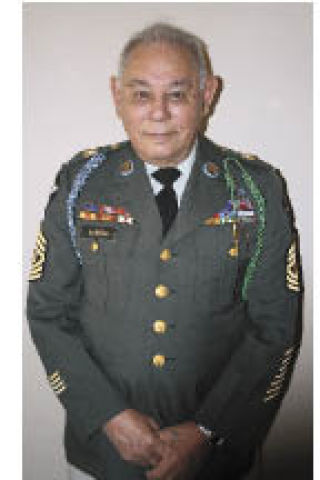ARLINGTON — As far as Eliseo Garcia was concerned, 14 years old was old enough to fight and die for his country.
Garcia is the newest member of Arlington Veterans of Foreign Wars Post 1561, and back in 1950, he fought his first war when he was technically too young even to be serving in the military.
Garcia was able to retire as a command sergeant major in the Army as the age of 38, after serving in Korea and Vietnam, because he’d enlisted when he was only 15 years old.
“I tried to join when I was 14, but they kicked me out,” Garcia said. “A year later, my father signed enlistment papers for me, saying that I was 17, just in time for me to go to Korea.”
Garcia is a short, quiet man, who still fits into his military dress uniform and speaks of his experiences in the service with a stoic level of understatement. When he revealed to this reporter that he was recommended for the Congressional Medal of Honor, twice, he punctuated it with a simple shrug of his shoulders. His tone was equally matter-of-fact when he explained his reasons for wanting to serve in the first place.
“I knew I had to be in, ever since I was a kid,” said Garcia, whose father lied about his own age to serve in World War II at the age of 14, and whose older brothers joined the military in World War II. Another older brother couldn’t join due to heart problems, but Garcia’s younger brother followed him into the Army after a few years, as did four of Garcia’s grandchildren.
“Our family felt an obligation to this country,” Garcia said. “My grandkids are in Iraq, and one grandson told me, ‘I’m following in your footsteps.’ I told him, ‘Don’t follow too close.’”
From 1950-1951, Garcia’s footsteps went from Pusan, through Kunu-ri and Chipyongi, to the “Spring Offensive” in Korea. From the ages of 16-17, he served a squad leader in Company L, 23rd Infantry Regiment, 2nd Infantry Division. And on Sept. 16, 1950, he knocked out two North Korean machine gun positions on the Naktong River, wounding him but earning him the Distinguished Service Cross, the nation’s second-highest military honor, and one of many awards and decorations he received during his time in service.
“People have asked me if I was afraid, and called me a liar when I said no,” said Garcia, who charged the machine gun nests to wipe them out with grenades. “I’m a Christian, so I believed that whatever happened, I’d go to a better place.”
Garcia’s rifle squad was also on the line for 87 days, the longest of any unit in Korea.
“By the time we got relieved, I’d gone 86 days without a shower,” said Garcia.
While Garcia served as a master sergeant in Vietnam years later, cutting off enemy troops from their sources of supplies and intelligence, he never again saw as much combat as he did in Korea.
“The paces of fire-fights have gotten a lot more relaxed,” Garcia said. “In 10 years, we lost 57,000 men in Vietnam, but in three years, we lost 45,000 men in Korea. In five years in Iraq, we’ve lost 4,000. I tell my grandkids there, just because there’s no action, it doesn’t mean you should drop your guard. As long as you’re in the field, you need to be on your toes.”
Garcia hopes that his grandchildren and their fellow troops in Iraq will pay attention to their surroundings, and that the sacrifices they make will not be in vain.
“Freedom is not as free as people believe,” Garcia said. “If we hadn’t fought Britain, we wouldn’t have become the United States. Our troops need to be built up.”







